Iran, Russia Sign Deal To Develop Space Industry
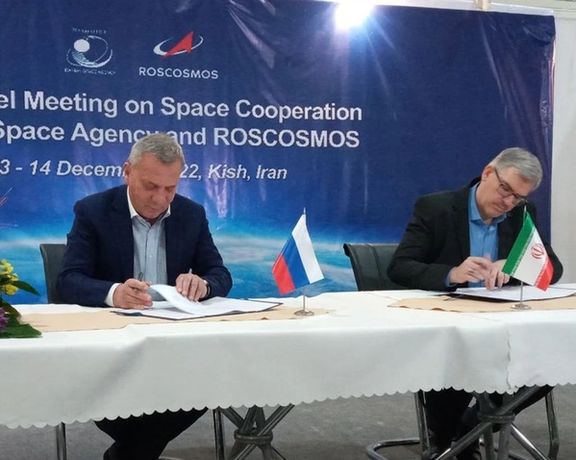
As the world expresses concerns over close military cooperation between Iran and Russia, they have signed a new agreement on cooperation in the space industry.

As the world expresses concerns over close military cooperation between Iran and Russia, they have signed a new agreement on cooperation in the space industry.
According to ISNA in Tehran, the two sides have agreed to jointly design and construct remote sensing and telecommunication satellites.
Joint development of infrastructure as well as holding training courses in this regard are among the other details of an agreement revealed on Wednesday.
The document was signed Wednesday by Iran’s head of Space Agency Hassan Salarieh and his Russian counterpart Yury Borisov on the sidelines of an International Aerospace Exhibition in the Kish Island in southern Iran.
Earlier in August, Iran launched a satellite called Khayyam into space from the Baikonur space station in Kazakhstan using Russia's Soyuz satellite carrier rocket.
The UK on Tuesday sanctioned 12 Russian military officials involved in missile strikes on Ukrainian cities as well as some Iranian businessmen involved in the production and supply of military drones used in the attacks.
The EU foreign ministers also lashed out at the Iranian regime Monday for supplying drones to Russia, saying the “weapons provided by Iran are being used indiscriminately by Russia against Ukrainian civilian population and infrastructure causing horrendous destruction and human suffering.”
The bloc sanctioned four people and four entities “for undermining or threatening the territorial integrity, sovereignty and independence of Ukraine.”
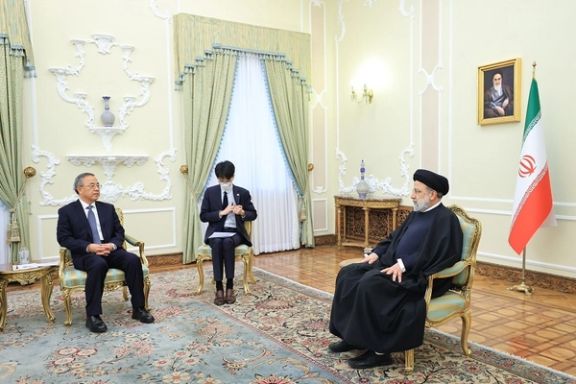
While China has undermined Iran’s territorial integrity by signing a Gulf Cooperation Council statement, Tehran has used a mild tone to express its dissatisfaction.
Iran’s President Ebrahim Raisi on Tuesday told China’s Deputy Prime Minister, Hu Chunhua, that the Islamic Republic is “unhappy” about the position of Beijing and expects its ally to make up for it.
However, he emphasized that the visit of the Chinese delegation to Iran is “important” for the development of mutual economic and commercial cooperation.
In a statement last week during the visit of China’s President Xi Jinping to Saudi Arabia, the Gulf Cooperation Council and the Chinese side made a reference to three small islands in the Persian Gulf that Iran took over as its historic territory in 1971 but the United Arab Emirates claims as its own.
The concluding statement of the meeting that was attended by GCC dignitaries as well as Xi Jinping said: “The leaders affirmed their support for all peaceful efforts, including the initiative and endeavors of the United Arab Emirates to reach a peaceful solution to the issue of the three islands; Greater Tunb, Lesser Tunb, and Abu Musa, through bilateral negotiations in accordance with the rules of international law, and to resolve this issue in accordance with international legitimacy.”
Following the United Kingdom’s withdrawal of its forces from the region to give independence to the small Arab littoral Sheikdoms, Iran’s Mohammad Reza Shah decided to take over the Greater and Lesser Tunbs and Abu Mousa. The UAE was just being formed and there was a serious political and military vacuum on the Arab side of the Persian Gulf.
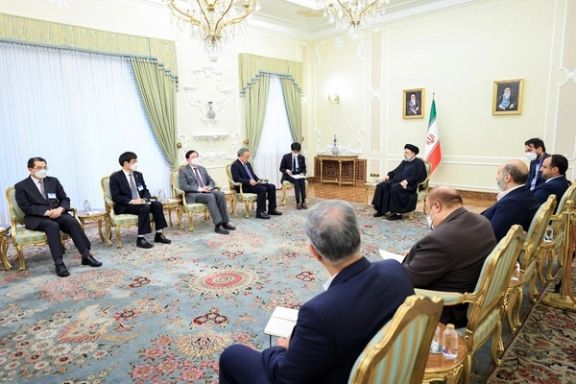
In the wake of China’s stance, many Iranians on social media harshly criticized their government for a major failure. They asked the clerical regime what exactly went wrong that its ally, China acquiesced to such a statement.
Iran’s foreign ministry on Saturday held a meeting with the Chinese envoy to Tehran to express its displeasure about the statement, but unlike the language it uses for Western countries, the foreign ministry did not use the term “summoning” saying the Chinese diplomat was “invited” and refrained from using terms like “protest” or “condemn”.
It said on its website that the envoy “had a visit” with an Iranian official on Saturday, during which Tehran’s “strong dissatisfaction” was expressed.
Regime’s Foreign Minister Hossein Amir-Abdollahian also came under fire after he said in a tweet “the islands are inseparable parts of Iran and are part of the eternal belongings of our motherland. We firmly insist on the need for respecting Iran's territorial integrity.”
Iranians on social media strongly criticized him saying he “did not even dare” to name China, and asking why he has only tweeted in Farsi this time whereas he used to tweet both in Farsi and Chinese to express support for China on Taiwan.
However, it was not the end of the story as China and the Gulf Cooperation Council member states urged for dialogue on Iran’s “destabilizing regional activities” and “support for terrorist and sectarian groups and illegal armed organizations”, as well as its ballistic missiles and drones proliferation.
The statement also emphasized that the peaceful nature of the Iranian nuclear program must be ensured urging the Islamic Republic to fully cooperate with the International Atomic Energy Agency.
Again, Iran’s reaction was so mild when the Foreign Ministry Spokesman Nasser Kanani said it was a “surprise” to see Iran-related clauses in the statement.
Hardliner Kayhan newspaper affiliated with the office of Supreme Leader Ali Khamenei wrote on Sunday, “The expansion of ties between Beijing and Riyadh is more a strategic challenge for the undisputed dominance of the US rather than being a challenge for Iran.” It added that China is entering a region that has always been considered the backyard of Washington.”
The state-run Iran Daily also claimed in its editorial Sunday that China and Russia “have no alternative in their regional policy except Iran” saying relations between Beijing and Arab states “will lead to the realization of the Islamic Republic’s interests.”
However, Nusratullah Tajik, the former ambassador of Iran to Jordan told a website Sunday that “The Chinese have clearly told us they do not agree with our anti-American approaches.”
“We should not rely too much on China as they may use or even misuse Iran's anti-US policy,” he added.

Iran appears set to be ousted from a UN women's body on Wednesday for policies contrary to the rights of women and girls, but several countries are expected to abstain.
The United States requested the vote after Mahsa Amini, a 22-year-old woman died in hijab police custody in September with deadly blows to her head. The incident triggered nationwide anti-regime protests during which more young women were killed.
The 54-member UN Economic and Social Council (ECOSOC) will vote on a US-drafted resolution to "remove with immediate effect the Islamic Republic of Iran from the Commission on the Status of Women for the remainder of its 2022-2026 term."
The 45-member Commission on the Status of Women meets annually every March and aims to promote gender equality and the empowerment of women. A US official told Reuters they had "consistently seen growing support" to remove Iran.
Iran, 17 other states and the Palestinians argued in a letter to ECOSOC on Monday that a vote "will undoubtedly create an unwelcome precedent that will ultimately prevent other Member States with different cultures, customs and traditions ... from contributing to the activities of such Commissions."
But Western countries and human rights defenders say Iran’s laws and policies severely discriminate against women and that is a universal rights issue.
Only five of the signatories to the letter are currently ECOSOC members and able to vote on Wednesday.
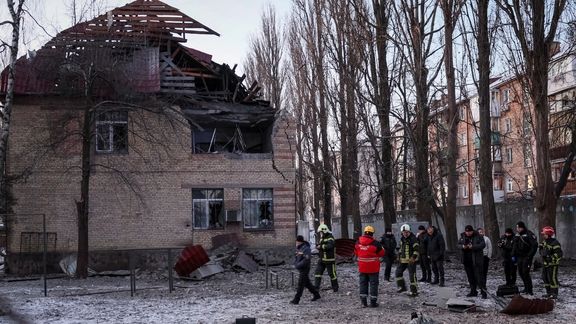
Kyiv's air defense systems shot down 10 Iranian-made drones Wednesday, while the United States is closer to sending its Patriot air defense system to Ukraine.
Kyiv Mayor Vitali Klitschko said that air-defense systems shot down 10 Iranian-made Shahed drones and that there were explosions in the central Shevchenkivskyi district.
The Kyiv administration said that according to preliminary information, two administrative buildings in Shevchenkivskyi were damaged and information about potential casualties was being clarified.
The United States warned about Iran planning to deliver Shahed Kamikaze drones to Russia in July, something Iran has repeatedly denied, only conceding that it gave “some drones” to Russia before the Ukraine war began.
Russia began using the Iranian drones mostly against civilian targets in early October, with hundreds launched so far, but most shot down before reaching their targets.
Washington could announce a decision as soon as Thursday on providing the Patriot, two officials told Reuters on Tuesday. The Patriot is considered one of the most advanced U.S. air defense systems and is usually in short supply, with allies around the world vying for it.
Former Russian President Dmitry Medvedev has warned NATO against equipping Kyiv with Patriot missile defenses, and it is likely the Kremlin will view the move as an escalation.
But there have been Western reports in the past weeks of possible Iranian missile deliveries to Russia as its arsenal is running out due to extensive use against Ukrainian infrastructure targets that are now well defended with multiple systems, but not full proof.
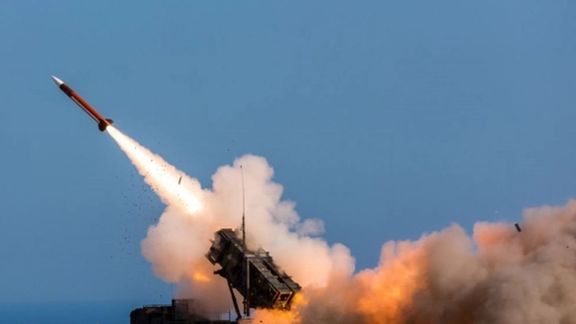
The Patriot system would help Ukraine defend against waves of Russian missile and drone attacks that have pounded the country's energy infrastructure.
The United States and its European allies have also imposed rounds of sanctions against Iranian individuals and entities for their involvement in supplying drones to Russia. The latest instance of such sanctions was announced by the United Kingdom on Tuesday.
Foreign Secretary James Cleverly said UK sanctions were “taking the wheels off the Russian war machine.” A press release referred to “information” released by the US December 9 - apparently a statement by White House Security spokesman John Kirby - showing Iran had become “one of Russia’s top military backers.”
Gaining Patriot air defense capability would be "very, very significant" for the Kyiv government, said Alexander Vindman, a retired Army lieutenant colonel and onetime leader of Ukraine policy at the White House.
"These are going to be quite capable of dealing with a lot of different challenges the Ukrainians have, especially if the Russians bring in short-range ballistic missiles" from Iran.
Kyiv held high-level military talks on Tuesday with Washington, Ukrainian President Volodymyr Zelenskiy's office said. The United States has given Ukraine $19.3 billion in military assistance since Russia's invasion on Feb. 24.
One of the US officials said Ukrainian forces would likely be trained in Germany before the Patriot equipment was delivered. Vindman said the training could take several months.
The Pentagon says Russia's recent surge in missile strikes is partly designed to exhaust Ukraine's supplies of air defenses so it can dominate the skies above the country.
For that reason, the United States and its allies have been delivering more air defenses to Kyiv, everything from Soviet-era systems to more modern, Western ones. Washington has provided NASAMS air defense systems that the Pentagon says have flawlessly intercepted Russian missiles in Ukraine.
With reporting by Reuters
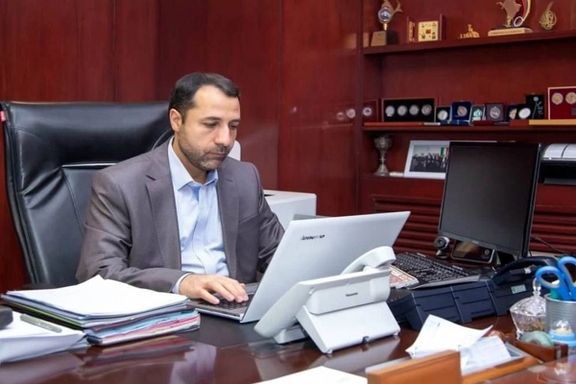
Calls are mounting to remove the chief of Central Bank of Iran (CBI) after the national currency hit another historic low against the US dollar on Tuesday.
Traders in Tehran exchanged 380,000 rials to one US dollar on Tuesday, up from a closing rate of 368,000 last week.
The accelerated fall of the rial has led to reasonable concerns in Tehran business and media circles that soon the dollar will surpass the 400,000 mark in a downward spiral no one can control.
Amid soaring prices, people on social media and websites said Ali Salehabadi, the CBI must be removed while some others believe he is going to resign soon; something he denied later in the day.
A lawmaker on Tuesday addressed the government, saying “President Raisi, Minister of Economy, Governor of the Central Bank, do you know the dollar rate has reached 380,000 rials?”
“What is the current situation you have created for people? They are facing problems in renting houses,” added Ramezanali Sangdavini.
According to a recent report by EcoIran website, food prices have jumped an average of 67.7 percent compared with the same period in the previous year.
Rials drop is directly tied to a 50-percent annual inflation rate. Recently, the CBI reported that housing prices in Tehran increased by 45.9% compared to the same period last year.
The average price of one square meter of housing in Tehran has reportedly reached 467,000,000 rials.
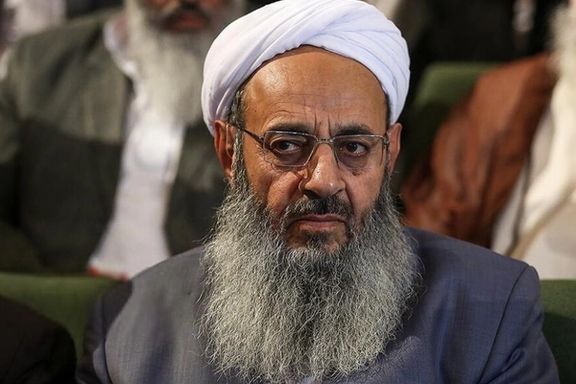
Leading Iranian Sunni cleric Mowlavi Abdolhamid has once again warned about the consequences of executions and suppression of protesters in Iran.
In a tweet on Monday, Abdolhamid, the religious leader of Iran’s largely Sunni Baluch population, asked the authorities of the Islamic Republic to listen to the voice of the protesters.
His comments came after the Iranian regime hanged a second protester, Majidreza Rahnavard in less than a week in public on Monday after charging him with killing two members of security forces.
“Arbitrary executions and repression have no result other than God’s displeasure, public hatred, and igniting the nation’s anger,” reads his tweet.
He further asked the government to “see the facts and hear the voice of the people.”
During his trial, Majidreza Rahnavard was denied the right to choose a lawyer, and his execution was carried out only 23 days after his arrest, which has raised many questions about the trial process and judicial justice.
Abdolhamid had previously said in reaction to the execution of Mohsen Shekari, who was the first protester hanged by the regime December 8, “it is not correct from the viewpoint of the Quran and Sharia to execute a person who did not kill anyone and only blocked the road and used a knife.”
Mohsen Shekari, the 23-year-old protester was only accused by the judiciary of blocking a street and injuring a Basij militia.